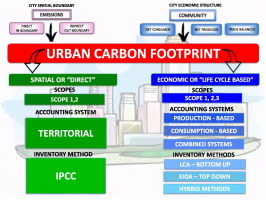当前位置:
X-MOL 学术
›
Environ. Impact Assess. Rev.
›
论文详情
Our official English website, www.x-mol.net, welcomes your
feedback! (Note: you will need to create a separate account there.)
Assessing the urban carbon footprint: An overview
Environmental Impact Assessment Review ( IF 9.8 ) Pub Date : 2017-09-01 , DOI: 10.1016/j.eiar.2017.06.005 Mariarosaria Lombardi , Elisabetta Laiola , Caterina Tricase , Roberto Rana
Environmental Impact Assessment Review ( IF 9.8 ) Pub Date : 2017-09-01 , DOI: 10.1016/j.eiar.2017.06.005 Mariarosaria Lombardi , Elisabetta Laiola , Caterina Tricase , Roberto Rana

|
Abstract All cities present environmental sustainability issues, above all regarding greenhouse gas (GHG) emissions, and specifically carbon dioxide (CO 2 ), that directly affect climate change. Consequently, it is very important to quantify and report their Carbon Footprint (CF) for implementing national and international policies/strategies aimed at mitigating and adapting these concerns. The Urban Carbon Footprint (UCF), indeed, has been recognized as the more valuable choice to inform, specifically, decision makers about city environmental sustainability. Several accounting systems and inventory methods have been taken into account to perform UCF, highlighting the complexity of the topic and generating very often confusion among users. In this context, the authors aim to summarize what has been done and what is going on with UCFs, trying to classify them according to some principal dimensions. Thus, they divide UFCs in two main categories namely: “spatial” or “direct”, with a limited amount of data requested, and “economic” or “life cycle based”, more or less data inclusive according to the accounting systems considered. Furthermore, they observe that there is not a “global agreed-upon protocol” yet, neither is there a specific model shared among researchers, even if some steps have been made towards this direction (Relative Carbon Footprint - RCF, Publicly Available Specification – PAS 2070 and Global Protocol for Community scale - GPC). Consequently, it is necessary to complete and standardize, in the short term, the accounting and reporting frameworks, in order to compare different UCFs for adopting shared climate strategies and actions at global level.
中文翻译:

评估城市碳足迹:概述
摘要 所有城市都存在环境可持续性问题,尤其是温室气体 (GHG) 排放,特别是直接影响气候变化的二氧化碳 (CO 2 )。因此,量化和报告他们的碳足迹 (CF) 以实施旨在减轻和适应这些问题的国家和国际政策/战略非常重要。事实上,城市碳足迹 (UCF) 已被公认为更有价值的选择,特别是为决策者提供有关城市环境可持续性的信息。执行 UCF 时考虑了多种会计系统和清单方法,突出了主题的复杂性,并经常在用户之间产生混淆。在此背景下,作者旨在总结 UCF 已完成的工作和正在发生的事情,试图根据一些主要维度对它们进行分类。因此,他们将 UFC 分为两个主要类别,即:“空间”或“直接”,所需数据量有限,以及“经济”或“基于生命周期”,根据所考虑的会计系统或多或少包含数据。此外,他们观察到还没有“全球一致同意的协议”,研究人员之间也没有共享特定的模型,即使已经朝着这个方向采取了一些步骤(相对碳足迹 - RCF,公开可用的规范 - PAS 2070 和全球社区规模协议 - GPC)。因此,有必要在短期内完成和标准化会计和报告框架,以便比较不同的 UCF 在全球层面采用共享的气候战略和行动。
更新日期:2017-09-01
中文翻译:

评估城市碳足迹:概述
摘要 所有城市都存在环境可持续性问题,尤其是温室气体 (GHG) 排放,特别是直接影响气候变化的二氧化碳 (CO 2 )。因此,量化和报告他们的碳足迹 (CF) 以实施旨在减轻和适应这些问题的国家和国际政策/战略非常重要。事实上,城市碳足迹 (UCF) 已被公认为更有价值的选择,特别是为决策者提供有关城市环境可持续性的信息。执行 UCF 时考虑了多种会计系统和清单方法,突出了主题的复杂性,并经常在用户之间产生混淆。在此背景下,作者旨在总结 UCF 已完成的工作和正在发生的事情,试图根据一些主要维度对它们进行分类。因此,他们将 UFC 分为两个主要类别,即:“空间”或“直接”,所需数据量有限,以及“经济”或“基于生命周期”,根据所考虑的会计系统或多或少包含数据。此外,他们观察到还没有“全球一致同意的协议”,研究人员之间也没有共享特定的模型,即使已经朝着这个方向采取了一些步骤(相对碳足迹 - RCF,公开可用的规范 - PAS 2070 和全球社区规模协议 - GPC)。因此,有必要在短期内完成和标准化会计和报告框架,以便比较不同的 UCF 在全球层面采用共享的气候战略和行动。











































 京公网安备 11010802027423号
京公网安备 11010802027423号